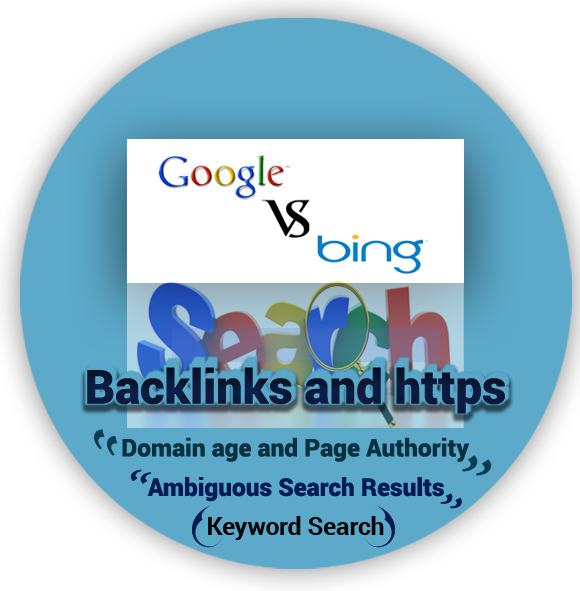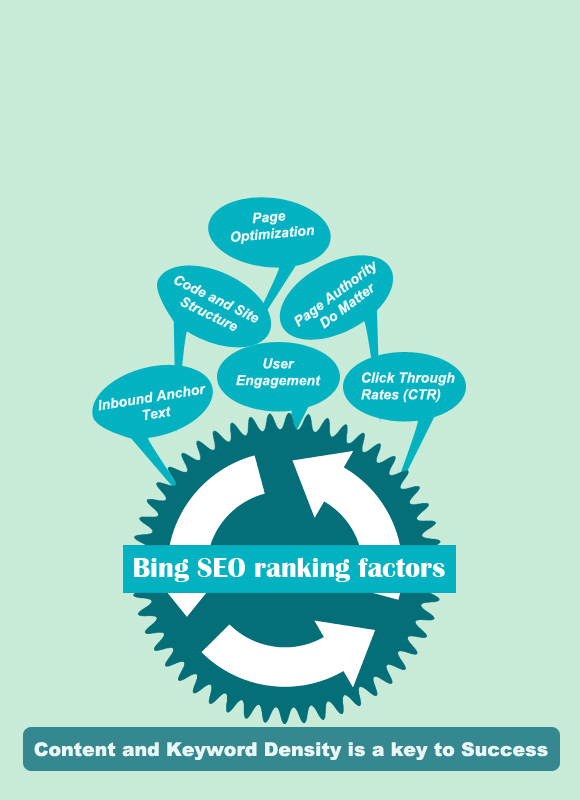Is it Time to Move focus on to Microsoft Site (Bing)?
Recently updated: February 12th, 2025
It seems the time has come for SEO specialists and marketers to broaden the focus of their search optimization efforts to make it less Google dependant and more inclusive and friendly to other search engine results like Yahoo and Bing. Statistics certainly favor a wider search engine optimization strategy, if comScore’s latest monthly qSearchanalysis report is anything to go by. ComScore’s latest report shows that between Nov-Dec 2104 Google’s market share of the US desktop search saw a dip from 67% to 65.4%. The chief gainers of Google’s loss appeared to be Yahoo and Microsoft with increase of 1.6% and 1% respectively for the same period last year.
While Google continues to rule the search engine landscape, it seems to be slowly but surely conceding ground to more aggressive and effective strategies employed by Bing and Yahoo respectively. This is also borne out by the report released by StatCounter earlier this month which showed Bing gaining an by 7% in the search engine market, an impressive gain by any standards and since the upward movement continues to grow for Bing, marketers are being forced to sit up and take notice as more and more turn to Bing to search for a service or a product.

Infact this might be the big opportunity SEO experts are looking for to increase traffic to their site without fundamentally altering their site to suit Google’s search ranking factors. Increasing focus on Bing might actually pay more dividends for marketers with the same investment.
If Mozilla’s recent shift from Google to Yahoo as the default search engine for US and Russia in version 34 released on December 1, 2014 is anything to go by, the search landscape is going to get increasingly competitive and marketers will do better to have a finger in each pie rather than focus exclusively on Google.
Mozilla’s shift saw Google’s usage drop from 82.14% to 63.46% within just 24 hours of release while Yahoo shares jumped to a high of 29.4% from just 9.54% a day before. And since Yahoo search is powered by Bing, the market signals are coming clear and loud.
Many marketers are under the misconception that Bing traffic is not nearly as valuable as traffic from Google due to comparatively lower conversion rates. But a closer analysis will show that marketers can actually get more bang out of their buck through Bing because traffic generated through Bing search:
- Spends more time on the site visiting more pages
- Has lower rate of bounce
- More prone to clicking on affiliate links
- More likely to subscribe to mailing list
Another popular misconception marketers have is that ranking high in Google search automatically guarantees high ranking on Bing and other search engines. But this is not the case as the algorithms function very differently in each case and the same search terms are likely to generate very different search results in each search engine.
What this means is that marketers cannot apply the same SEO factors for Google search to Bing to get the same kind of results. Getting good ranking on Bing is only possible by first understanding the Bing ranking factors and then using them to optimize your site accordingly. The job is actually made much easier by Microsoft which makes a number of useful SEO tools and resources available for users to optimize their web site.
Unlike Google, Microsoft has actually made available a number of very helpful tools &resources for Bing SEO. Bing SEO ranking factors include:

User Engagement
Bing Search places a great deal of emphasis on User Engagement which is measured through pogo stacking, a term used to describe the event of a viewer clicking on a search results and then clicking back to return to the main search results page.
Bing gives high ranking to sites with high rate of people visiting the site from search results and remaining on the site without clicking the back button to return the main search results page. And correspondingly Bings ranks sites which witness high rates of visitors clicking back to the main search page low because it obviously shows low levels of user engagement with the website.
Click Through Rates (CTR)
Click through rates are also a big factor in Bing search especially combined with User Engagement. The higher click rate of a site irrespective of its ranking in search pages, for instance if a site ranked No.2 has a higher click through rate than a site ranked No.1 in search results, Bing search takes it as an indication of the fact that Site ranked No.2 is more relevant for the particular search and will accordingly improve its ranking.
This is also a signal for marketers to include search specific keywords in the titles and descriptions that are likely to attract human attention.
Also Read: Way to Improve Click Through Rate (CTR)
Impact of Social Signals on Search Engine Ranking
It is safe to say that Bing search places much greater reliance on social signals than Google since Bing actually returns search results with Twitter and Facebook embedded posts. Marketers are likely to see much higher search rankings on Bing by increasing their presence on Facebook and Twitter and garnering more viewership.
Inbound Anchor Text
Bing also places greater reliance on anchor text usage than Google because unlike Google Bing is not as good at keyword matching and building context and synonyms around it. Ensuring links coming from high anchor sites are optimized for specific anchor texts should work wonders with Bing, the only risk marketers run is that of over optimizing the content and getting on the wrong side of Google.
Page Authority Do Matter
It is fairly clear that Bing places greater emphasis on aged sites whereas newer domains are likely to find Google more receptive than Bing. However if you already have an older domain you are likely to see higher ranking in Bing because Bing search factors in the age of the site as well.
Content and Keyword Density is key to Success
Bing places a high degree of reliance not only on unique content but also on the length of the content. The longer the content and more engaging it is, the higher your site is likely to show up in Bing ranking. Keyword density is also a big factor in Bing but here marketers need to tread carefully, since over optimizing for keyword density can lead to getting thrown out by Google.
Code and Site Structure
The quality of the coding the structuring of the site is also important for Bing. It makes it very clear that all content should be not more than 3 clicks away from the homepage.
Page Optimization
Lastly, general optimization of the webpage for meta title and meta tags remains equally important for both Bing and Google.
Google on the other hand, as we all know, uses 200 factors in its search algorithm making it a whole different ball game for SEO experts. It is always good to gain a good understanding of the key differences between Google and Bing search engines before starting on SEO to ensure your site is well ranked in the 2 most popular search engines.
Differences between Google and Bing Search

Backlinks and https
Firstly and most importantly Bing places very little emphasis on Backlinks and https, both of which rank high in factors affecting Google Search. https is a recently updated factor in Google search while Bing does not attach any importance to it whatsoever at this point.
Domain age and Page Authority
As discussed earlier, Bing places a lot of emphasis on domain age, the older the domain, the greater the ranking while Google does not give it too much weightage. Google also does not give preference to .gov or .edu sites by ranking them higher unlike Bing which gives higher weightage to sites with .gov or .edu
Searches with ambiguity or which carry more than one reference point.
Ambiguous Search Results
When someone searches for phrases like “The Great Wall”, Google is likely to throw up results based on popularity, meaning the most popular website associated with that keyword search is likely to rank first and so on and so forth. Bing on the other hand is more likely to throw local search results related to the particular keyword search, for instance if you are based in US and searching for The Great Wall, is might throw up a restaurant or bar or fitness centre in your area with a similar name or keyword before other listings.
Keyword Search
As discussed earlier, Google search takes into account synonyms and the context of the keyword as well while searching whereas Bing search is aligned towards exact keyword search. What this means for marketers is that they have a little more flexibility while optimizing website content for Google, but when it comes to Bing it pays more to include specific keyword phrases.
The growing importance of Bing search and how marketers need to start focusing on advertising on Bing for greater results was earlier well discussed in our post “Are You Advertising on Bing, Yet?”. The Even at that time we had clearly highlighted why advertisers need to move away from spending exclusively on Google to include other search engines like Bing because that’s where an increasing number of customers are moving as well.
By shifting portions of the ad money from Google to Bing, advertisers are likely to see much better results because viewers at Bing are not only likely to be more relevant, they are also much more engaged and likely to purchase, all of which means translates to higher sales and more return on investment. Businesses offering SEO services and SEO packages should incorporate Bing-specific strategies to help clients maximize their online visibility and reach a broader audience.
So if you have not already started focusing your advertising and marketing efforts on improving your Bing ranking and making yourself more visible there, its time you started to before your competitors get the first mover advantage.
Latest posts by Vijaya Tyagi (see all)
How To Track Shopify SEO Performance & Metrics (2025) - January 14, 2025
Link Building Strategies: The Ultimate Techniques for 2025 - December 31, 2024

